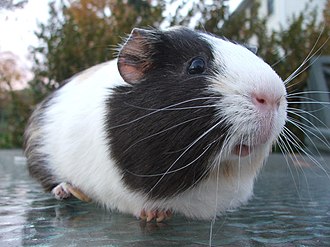- Guinea pigs, also known as cavies, are small domesticated rodents that are popular as pets.
- They originate from the Andes region in South America, particularly Peru and Bolivia.
- Guinea pigs were originally domesticated for their meat and used in religious ceremonies by indigenous cultures.
- They are social animals and thrive in the company of other guinea pigs or humans.
- Guinea pigs have a lifespan of about 5 to 7 years, although some can live even longer with proper care.
- They communicate through a variety of sounds, including squealing, purring, chirping, and rumbling.
- Guinea pigs have a unique digestive system called hindgut fermentation, enabling them to extract nutrients from fibrous plant material.
- They are herbivores and require a diet rich in fresh vegetables, hay, and a small amount of pelleted food.
- Guinea pigs have a natural behavior called “popcorning” where they jump and twist their bodies in excitement.
- They come in a variety of coat colors and patterns, including solid, tortoiseshell, roan, and agouti.
- Guinea pigs have large front teeth that continuously grow throughout their lives, requiring regular chewing to wear them down.
- They are excellent swimmers and enjoy occasional baths, although they should be dried thoroughly afterward to prevent health issues.
- Guinea pigs have poor eyesight but compensate with a keen sense of hearing and smell.
- They are crepuscular animals, meaning they are most active during dawn and dusk.
- Guinea pigs have four toes on their front feet and three toes on their hind feet, each equipped with sharp claws.
- They are highly susceptible to heatstroke, so it is important to provide them with a cool and well-ventilated environment.
- Guinea pigs are gentle and rarely bite, making them suitable pets for families with children.
- They are known for their docile and friendly nature, often developing strong bonds with their human caregivers.
- Guinea pigs can be trained to respond to their names and to perform simple tricks.
- They are prone to obesity, so it is crucial to monitor their diet and provide regular exercise opportunities.
- Guinea pigs have a wide range of vocalizations, including chirps, whistles, purrs, and even teeth chattering when annoyed.
- They are excellent jumpers and can clear small obstacles and low barriers.
- Guinea pigs have scent glands on their rumps, which they use for marking their territory and communicating with other guinea pigs.
- They are very sensitive to loud noises and sudden movements, so it’s important to provide them with a calm and quiet environment.
- Guinea pigs have a natural instinct to burrow and hide, so providing them with tunnels and hideouts is essential for their well-being.
- They have a gestation period of approximately 68 days and usually give birth to litters of 2 to 4 pups, called “piggies.”
- Guinea pigs are not related to pigs and are not native to Guinea.
- They have a specialized structure called the “whorl” on their fur, allowing them to maintain a dry and clean coat.
- Guinea pigs are susceptible to respiratory infections, so maintaining proper hygiene and a clean living environment is crucial.
- They are known to be sensitive to vitamin C deficiency, which can lead to scurvy. Therefore, a diet rich in vitamin C is essential for their health.
- Guinea pigs have a well-developed sense of touch and enjoy being gently stroked and petted.
- They are highly adaptable and can adjust well to different living conditions, as long as their basic needs are met.
- Guinea pigs have a natural instinct to explore and forage, so providing them with toys and interactive activities is important for their mental stimulation.
- They are hindgut fermenters, meaning they ferment plant material in their large intestine to extract additional nutrients.
- Guinea pigs have a relatively low body temperature compared to other mammals, typically ranging from 99°F to 103°F (37°C to 39.4°C).
- They are susceptible to certain health issues, including dental problems, respiratory infections, and urinary tract infections.
- Guinea pigs have a unique behavior called “rumblestrutting” where males make a deep vibrating sound to assert dominance during courtship or territorial disputes.
- They are coprophagic, meaning they eat their own feces to extract additional nutrients from undigested plant material.
- Guinea pigs have well-developed muscles in their jaws, allowing them to chew through tough vegetation.
- They have a natural instinct to establish a hierarchy within a group, often displayed through subtle body language and dominance behaviors.
- Guinea pigs have a highly developed sense of smell, which helps them navigate their environment and identify familiar scents.
- They are meticulous groomers and spend a significant amount of time cleaning their fur using their teeth and tongues.
- Guinea pigs have delicate feet, so providing them with a soft bedding material is important to prevent foot sores.
- They have a unique behavior called “popcorning,” where they jump into the air with excitement or during play.
- Guinea pigs are social animals and thrive in pairs or small groups, as they rely on companionship for their emotional well-being.
- They have a sensitive respiratory system and should be kept away from tobacco smoke, strong chemicals, and dusty environments.
- Guinea pigs have a keen sense of spatial awareness and can navigate through mazes and obstacles with ease.
- They have a remarkable ability to remember familiar faces and associate them with positive experiences.
- Guinea pigs are known for their gentle vocalizations called “wheeking,” which is often used to communicate excitement or to request food.
- They are delightful and charming companions, bringing joy and laughter to the lives of their human caregivers with their unique personalities and endearing behavior.
Facebook Comments


































